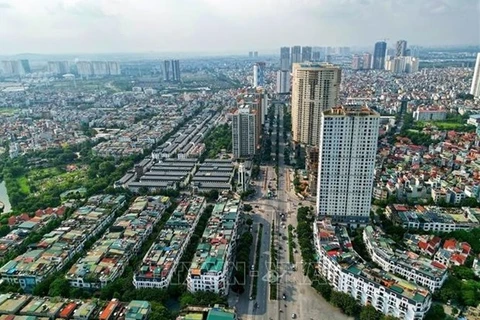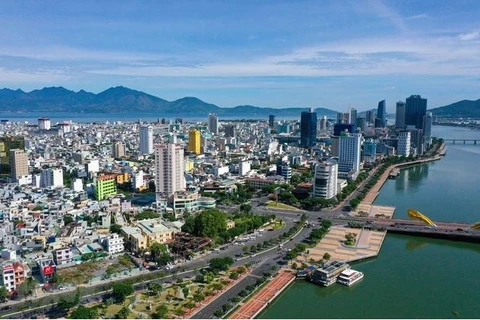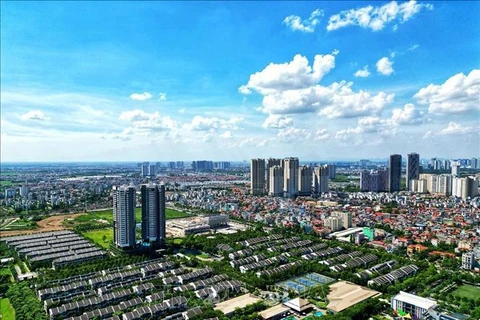 The real estate market in 2023 has gradually witnessed positive developments. (Photo: Hung Vo/Vietnam+)
The real estate market in 2023 has gradually witnessed positive developments. (Photo: Hung Vo/Vietnam+) Heading towards the goal with many major policies being issued.
- Could you please share the highlights of the Construction industry in 2023?
Deputy Minister Nguyen Van Sinh: In 2023, the Construction industry exceeded and achieved 10 out of 12 set targets, including completing 5 out of 5 targets assigned by the Government.
Some key indicators include a construction industry growth rate of 7.06% (contributing 0.51 percentage points to the overall GDP. The urbanization rate reached 42.7% and the average housing area per capita nationwide reached 26 square meters per person.
Especially, during the 6th session of the 15th National Assembly, two important draft laws led by the Ministry of Construction were simultaneously passed. The Housing Law of 2023 and the Real Estate Business Law of 2023 became apart of the legal landscape. These laws institutionalize the Party's viewpoints and policies, ensuring the unity and coherence of the legal system. They resolve conflicting issues in related housing policies and laws such as land, investment, construction, and credit.
In addition, the Construction sector has implemented Resolution No. 06-NQ/TW of the Politburo on planning, construction, management, and sustainable development of Vietnamese urban areas. Flexible solutions have been deployed to overcome difficulties and promote the safe, healthy, and sustainable development of the real estate market.
Furthermore, the Ministry of Construction has numerous achievements in Digital Transformation. These are the reforming and simplifying of administrative procedures and business conditions. Urban planning and architectural management have achieved many positive results and restructuring businesses have achieved noteworthy results.
- In the past year, two very important laws, the Law on Housing (amended) and the Law on Real Estate Business (amended), passed by the 15th National Assembly, have received special attention from experts and people nationwide. Could you please provide more information about the most prominent new points of these two laws?
- Deputy Minister Nguyen Van Sinh: The highlights of these two laws are that they institutionalize the Party's directions and state policies in developing housing for the people, especially low-income and poor individuals. They tightly manage the real estate market, promote healthy development, and synchronize with the land use rights market, and the labor market. They also address existing constraints, ensure constitutional conformity and coherence between housing laws, real estate business laws, and other related laws.
In particular, the amended law has revised and supplemented policies regarding social housing. For example, regulations on land funds allocated for social housing development have been highlighted. This creates favorable conditions for low-income individuals when registering to buy, rent, or lease-purchase social housing. They amend incentives for investors, and provisions regarding the selection of social housing project investors are synchronized with investment, land, and bidding laws.
Similarly, the 2023 Law on Real Estate Business has also amended specific provisions regarding types of real estate, real estate projects brought into business, and regulations on land use rights with technical infrastructure in real estate projects. They bring transparency to information on real estate projects brought into business, and improve policies for building and managing information systems, databases on housing and real estate markets to ensure clear, stringent, and feasible legal connections. They also share data with the national land database, databases of relevant ministries, branches, localities, and related agencies.
Unlocking capital sources, accelerating the progress of new projects
 In 2024, the Ministry of Construction will continue to review the challenges faced by real estate projects. (Photo: Hung Vo/Vietnam+)
In 2024, the Ministry of Construction will continue to review the challenges faced by real estate projects. (Photo: Hung Vo/Vietnam+) - Alongside bright spots, 2023 was also a challenging period for the real estate market. What solutions will the Ministry of Construction propose to promote the development of the real estate market in the coming time?
Deputy Minister Nguyen Van Sinh: To ensure a healthier and more sustainable real estate market in the coming time, the Ministry of Construction will continue to coordinate with other ministries, sectors, and localities to focus on researching, proposing, and perfecting decrees and circulars to specify the provisions of the Law on Housing 2023 and the Law on Real Estate Business 2023, ensuring their effectiveness simultaneously with these laws from January 1, 2025.
The ministry will also continue to implement synchronized solutions to achieve the objectives outlined in the project, "At least 1 million social housing units for low-income earners, industrial zone workers in the period 2021-2030." This will increase the supply of social housing and housing for workers, helping to balance the housing supply among different segments of the real estate market.
Additionally, we will continue to carry out the ongoing task of Task Force 1435 to resolve difficulties and obstacles for real estate projects. We will also review the challenges of other projects and urge localities to accelerate the progress of resolving investment and land procedures to promptly implement new projects.
Furthermore, the Ministry of Construction will collaborate with the State Bank of Vietnam and relevant ministries and sectors to propose solutions to stimulate capital flow into the real estate market. It will also push for the deployment of a credit package of around 120 trillion VND to provide low-interest loans for investors and homebuyers of social housing and worker housing projects.
The improvements will prioritize sustainable solutions for social housing development.
- Please share more insights into the current situation of implementing programs and projects for social housing and housing for workers with low incomes.
Deputy Minister Nguyen Van Sinh: On April 3, 2023, the Prime Minister approved the social housing project to 2030. This project set the goal of completing the investment and construction of social housing nationwide for the periods 2021-2025 with 428,000 apartments and 2025-2030 with 634,200 apartments, along with specific completion targets for each locality in each period.
As of the end of 2023, there were 475 social housing projects for low-income earners and industrial zone workers across the country, with a total scale of 432,698 apartments that have been completed and invested in construction. Specifically, 46 projects with 20,210 apartments have been completed, and construction has commenced on 120 projects with 120,066 apartments.
Although some significant results have been achieved, there are still certain obstacles in implementing the project. For example, although the amended Housing Law has been passed by the 15th National Assembly, it will only come into effect on January 1, 2025. This delay affects the development of social housing projects, as it does not encourage or attract many investors to launch new projects in 2024.
Many localities also lack interest in developing social housing and housing for industrial zone workers and laborers.
Furthermore, the disbursement progress of the 120 trillion VND package is still slow. The interest rate for the 120 trillion VND package is still high, and the short loan term is not attractive enough to attract businesses or individuals to borrow.
- In the near future, what specific solutions will the Ministry of Construction have to accelerate the progress of developing social housing, housing for workers, and low-income earners, and achieve the set goals soon?
Deputy Minister Nguyen Van Sinh: In 2024, the Ministry of Construction will continue to coordinate with relevant ministries, sectors, and localities to implement tasks to strengthen the implementation of the social housing project from 2021-2030.
To achieve the set goals, the ministry will focus on researching, proposing, and completing the legal system on housing. This will serve to ensure effectiveness concurrently with the Housing Law 2023 (from January 1, 2025), thereby resolving obstacles in mechanisms, policies, and laws, promoting the development of social housing and housing for industrial zone workers.
In 2024, the ministry will also work with several key localities to inspect and urge the review and supplementation of planning, allocation of land funds for social housing development. It will provide guidance, clarification, and resolve policy and legal issues during the implementation process and promote the creation of social housing supply.
We will regularly monitor the progress of implementing the social housing project in localities, to urge, remind, and report to the Prime Minister for timely directive solutions.
State management agencies in the field of housing and real estate will also urge localities to review, list social housing projects, worker housing, renovate and rebuild condominiums eligible for loans to be publicly announced on the provincial People's Committee's portal, for commercial banks to apply for loans under the 120 trillion VND package. They will also coordinate with the State Bank and relevant ministries and sectors to research and report to the Government, Prime Minister on further solutions to reduce interest rates and extend preferential loan terms.
- Thank you!
























